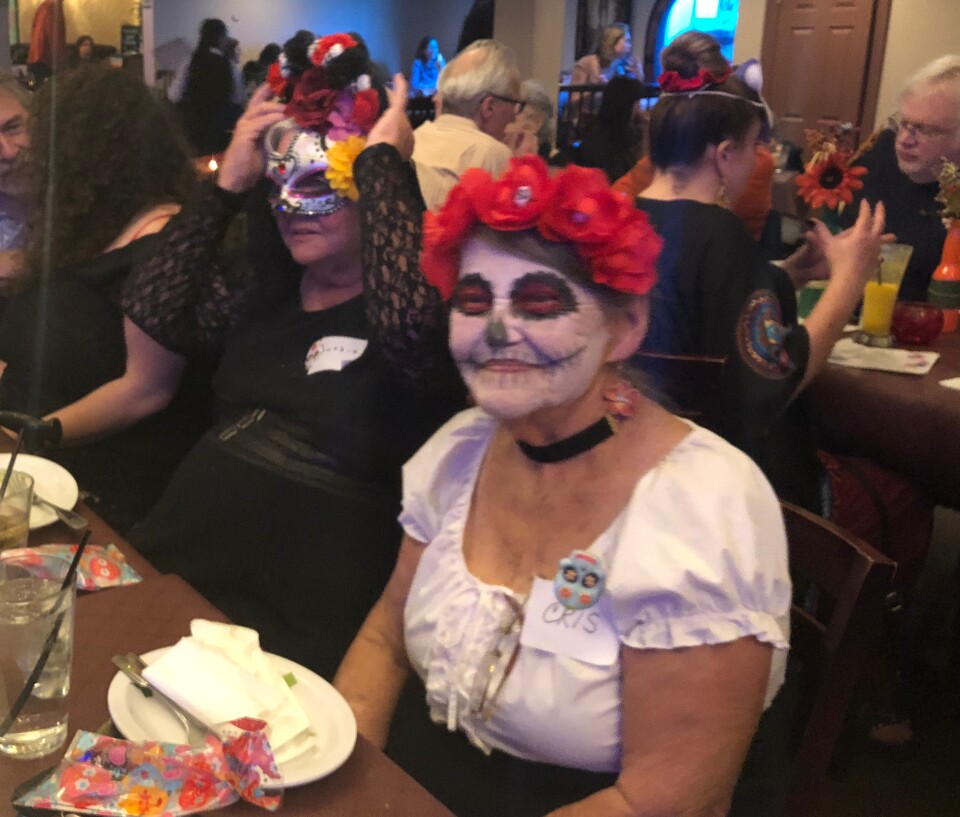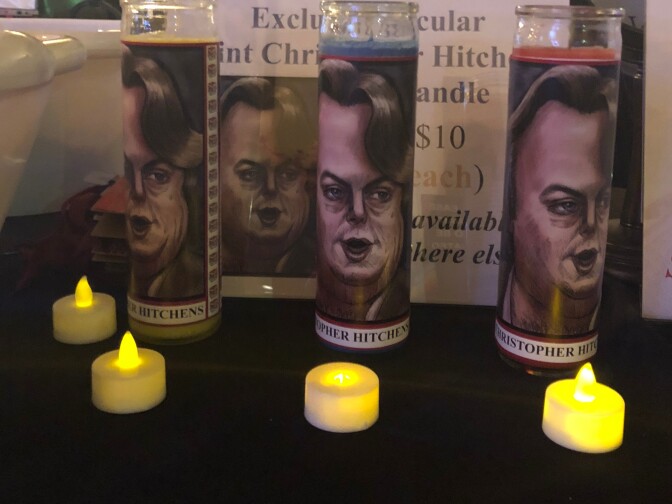Truth matters. Community matters. Your support makes both possible. LAist is one of the few places where news remains independent and free from political and corporate influence. Stand up for truth and for LAist. Make your year-end tax-deductible gift now.
This archival content was originally written for and published on KPCC.org. Keep in mind that links and images may no longer work — and references may be outdated.
Angelenos celebrate first ‘Secular Day of the Dead’
The Day of the Dead holiday is rooted in Mexican indigenous tradition and closely tied to the Catholic Church’s All Souls’ Day, but one local celebration was explicitly religion-free.
About 50 people turned out Thursday for Los Angeles’ first “Secular Day of the Dead” at La Fonda Mexican restaurant in Koreatown.
“Remembering our deceased loved ones is not the sole territory of religions, and it’s part of who we are as a species,” said Christine Jones, with Atheists United, who helped organized the event. “We all need to feel like we can remember the people that we love.”
Jones is Latina and was raised Catholic by her Mexican-American mother. Now an atheist, she wanted an event where the growing number of Hispanics who don’t believe in God could celebrate an important cultural holiday without prayer or religious dogma.
“For me, this is a way to re-embrace a tradition I belong to,” Jones said.
The holiday, also called Dia de los Muertos, is celebrated primarily in Mexico and by people of Mexican heritage elsewhere.
“Back home, it’s a big celebration. Music, food, flowers,” said Pedro Maldonado, who grew up in Central Mexico and attended L.A.’s secular event. “So, you don’t have to believe in the religious way, but just to remember the loved ones.”

Co-sponsors included Sunday Assembly Los Angeles, the Center for Inquiry and the Freethought Society.
“Day of the Dead may seem like it’s getting more secular as time goes on, in the mass media,” said Jim Underdown of the Center for Inquiry. “But the perception among the unbeliever community — atheists, agnostics, secular humanists — is that this is very much tied to the church and religious beliefs. So, we needed to sort of recreate it a little bit.”
Participants ate Mexican food, listened to mariachi tunes and lit candles for so-called “secular saints” like Frida Kahlo and Charles Darwin. Katie Reyes came to remember her brother, a fire captain who she said recently died by suicide.
“I brought my picture of him to celebrate with other friends who are nonbelievers,” Reyes said.
Organizers said they hope the event reaches local Latinos looking for communities of like-minded people.
“We need to do a better job making nontheist Hispanics feel like they can still have their culture and have a home,” said Margaret Downey of the Freethought Society. “We thought this would be the perfect way to connect.”

Local Latino Catholic theologians say a secular celebration of this colorful holiday is welcome in Los Angeles.
“I don’t think any celebration that brings people together and allows people to think about those who have come before them has anything harmful about it,” said Cecilia Gonzalez-Andrieu at Loyola Marymount University.
This amalgam of Native American spiritualism and Catholic tradition has a place and meaning in a secular celebration, said Rev. Guillermo Garcia at Mount St. Mary’s University.
“For all of us who are Latinos, this expression of our cultural roots is very important,” Garcia said. “Whatever we ourselves believe about an afterlife, sitting and remembering and giving thanks for what people have done for us is a healthy and healing part of life.”
Aaron Schrank covers religion, international affairs and the Southern California diaspora under a grant from the Luce Foundation.











